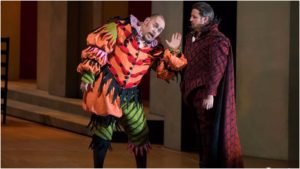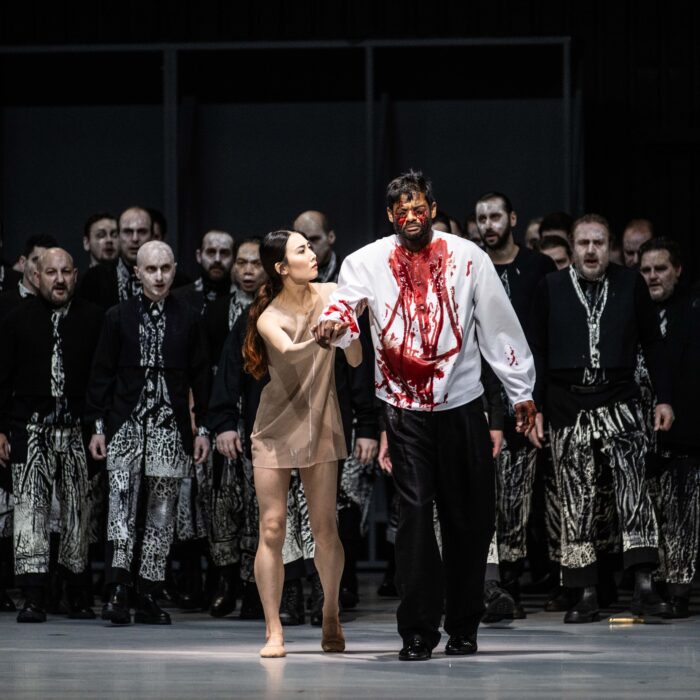
Lyric Opera of Chicago 2017-18 Review – Rigoletto: Matthew Polenzani, Quinn Kelsey and Rosa Feola Dazzle in Verdi’s Tragedy
By Santosh VenkataramanThe Lyric Opera of Chicago opened its season with a fabulous collaboration with the Joffrey Ballet with the French version of “Orphée et Eurydice.” It was a sensational production, although the fact that Gluck’s work doesn’t really feature a great amount of singing perhaps left a void for some hearty Lyric operagoers.
Anybody who felt that way certainly had their wishes met with the company’s staging of Verdi’s “Rigoletto” in a revival directed by E. Loren Meeker featuring sets by Michael Yeargan. This was the type of classic, traditional opera experience that Lyric and its public adores and it featured a superstar cast that delivered over and over again to an audience that soaked up every bit of emotion in a performance seen October 30.
Armiliato in Charge
Start with a star in the pit in conductor Marco Armiliato, whose reputation as a singer’s conductor is first-rate. Armiliato was in complete control of the proceedings, and even the audience, as he raised his baton to settle down restless patrons before the commencement of the third act after a set change.
Armiliato certainly got to the heart of the matter of this opera through Verdi’s music but that’s not the biggest reason to hail him for his work. It’s because the maestro was fully aware of what he had on stage and was savvy enough to let this star-studded cast of singers showcase their talent.
Reigning Duke
Playing the role of the Duke of Mantua was local favorite Matthew Polenzani, a singer revered at the Lyric as a native son of the area and former Ryan Opera Center member. The tenor seems to be entering the prime years of his vocal career as was confirmed by his commanding presence back in March in the title role of “Idomeneo” at the Metropolitan Opera alongside a similarly powerhouse cast.
Polenzani has said that it takes time for him to engage in villainous roles; in truth, he is far too nice a man to get to the (lack of) heart of nefarious characters such as the Duke. But if his personality on stage doesn’t contain a natural sense of evil, his lustrous singing makes him all the more believable as a womanizer, seducer and man with no scruples.
His solo arias in “Questa o quella” and the famous “La Donna e mobile” were sung beautifully as expected. But his best effort may have been in his Act two duet with Gilda of “È il sol dell’anima” in which he introduces himself as the penniless Gualtier Malde and also in his seduction of Maddalena in Act three. At the sight of the smile that curled on his lips at the sight of Maddalena, there was no doubt that this was a Duke to be reviled by all.
A Triumphant Lead
Another favorite at Lyric is baritone Quinn Kelsey, whose Rigoletto has been seen in many houses and just recently in this same production in San Francisco. While Kelsey’s voice takes some getting used to, he is a supremely talented artist and his Rigoletto conveyed the many mixed emotions the title role brings.
Kelsey’s Rigoletto didn’t seem to really land his jabs at Count Ceprano in the beginning and didn’t look too revolting in a standard jester’s outfit because his portrayal wasn’t about sarcasm. The strength was in his 100 percent devotion to his daughter with his “Cortigiani, vil razza dannata” in the second act and lament of “La maledizione” in the finale. It drove home this interpretation of Rigoletto as a father first and foremost with other roles as a jester and object of ridicule to the background. Kelsey gave his Rigoletto a very human touch.
A Debut to Remember
Soprano Rosa Feola was new to the Lyric stage but not to the knowledgeable crowd that saw her with the Chicago Symphony Orchestra just over a year ago in a concert staging of “Falstaff” as one of maestro Riccardo Muti’s hand-picked choices for Nannetta. And make no mistake about it, this was no neophyte when the curtain rose.
Feola was a mesmerizing and dazzling Gilda in terms of phrasing, lyrical quality and stage presence. Her “Caro nome” was without a doubt the most spectacular moment in a night full of them. Feola captured the innocence and naïvete of a sheltered young woman yearning for love. Even the way she spoke the name “Gualtier Malde” before launching into “Caro nome” highlighted Gilda’s chasteness and simple nature.
One of the more ridiculous aspects of the plot has always been why the deceived Gilda would sacrifice herself once she learned the Duke’s true nature. With Feola, this hurdle was easily cleared because of how pure-hearted her characterization was. Feola is one of the most exciting new sopranos to grace the operatic stage and her Met debut can’t be too far away.
Fabulous all around
Rounding out the cast was Ukrainian bass-baritone Alexander Tsymbalyuk as Sparafucile and Latvian mezzo-soprano Zanda Švēde as Maddalena in house debuts for both, with Švēde also part of the San Francisco run with Kelsey. Takaoki Onishi, a baritone who is a Ryan Opera Center member, made the most of his Marullo as an arrogant ringleader for the abduction of Gilda. All were part of tremendous singing required for one of opera’s most beloved works.


